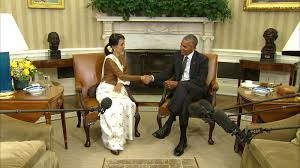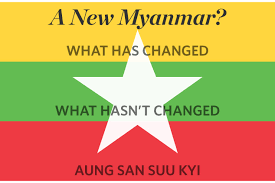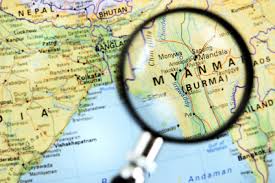President Obama Pledges to Lift Myanmar Sanctions
 Jacqui Merrill, an associate at The Volkov Law Group, rejoins us for a posting on the Myanmar Sanctions. Jacqui can be reached at [email protected].
Jacqui Merrill, an associate at The Volkov Law Group, rejoins us for a posting on the Myanmar Sanctions. Jacqui can be reached at [email protected].
On September 14, 2016, President Obama met with Myanmar’s leader, State Counsellor Daw Aung Suu Kyi, at the White House and announced the United States’ intent to remove economic sanctions against Myanmar (formerly known as Burma) in the near future. The President cited Myanmar’s recent steps towards democracy after many years of violent control by a military junta: the State Peace and Development Council.
Over the last few years, the U.S. has relaxed its Myanmar sanctions as the country slowly instituted political reforms. The elimination of the remaining sanctions will be a welcome relief, but the real issue will be changes to the Specially Designated Nationals list. The SDN list has continued to prevent business transactions with a number of key Myanmar businesses and individuals. However, OFAC expects to eliminate some of the SDN designations in the next year.
The U.S. has implemented rules restricting trade with Myanmar at varying levels since 1997, when President Bill Clinton issued Executive Order 13047, determining that the Government of Myanmar had committed large-scale repression of the democratic opposition in Myanmar. Myanmar’s government annulled the country’s 1990 elections, holding the National League for Democracy’s leader, Aung San Suu Kyi, under arrest (she would not be released until November 2010) and detaining hundreds of students and activists. President Clinton declared a national emergency to deal with the unusual and extraordinary threat posed by the Myanmar government’s actions and policies, and this first executive order prohibited new investment in Myanmar by a United States person.
Due to the government of Myanmar’s continued large-scale repression and human rights abuses throughout the early 2000s, President George W. Bush left the sanctions in place during his tenure. Although Myanmar ostensibly inaugurated a multiparty democratic system pursuant to its constitution ratified in 2008, the country’s positions of power continued to be dominated by the military. In March 2011, the State Peace and Development Council signed a decree mandating its dissolution, and a new so-called civilian government was simultaneously installed behind closed doors. This attempted transition to democracy was widely criticized as a sham, as many of the key figures from the former junta retained power.
However, once in power, the quasi-civilian government made good on its promise to move towards a true democracy by freeing political prisoners, legalizing trade unions and protests, and beginning to overhaul its economy and ease its media censorship.
In July 2012, in the U.S.’s first action to relax the sanctions, President Obama issued Executive Order 13619, which modified the scope of the national emergency declared in Executive Order 13047 and blocked only the property and interests in property of persons or entities determined to meet the criteria set forth in Executive Order 13619. At this point, the President also took a number of steps to authorize new U.S. investment in Myanmar and  the exportation or reexportation of U.S. financial services to Myanmar, subject to certain limitations and requirements (such as a ban on facilitating new investment with the Burmese Ministry of Defense). In 2013, OFAC Issued a general license authorizing U.S. persons to conduct most transactions.
the exportation or reexportation of U.S. financial services to Myanmar, subject to certain limitations and requirements (such as a ban on facilitating new investment with the Burmese Ministry of Defense). In 2013, OFAC Issued a general license authorizing U.S. persons to conduct most transactions.
In November 2015, following Myanmar’s first peaceful and competitive nationwide election in 25 years, the opposition group, National League for Democracy, prevailed. The party’s candidate, Aung San Suu Kyi, was elected the country’s new State Counsellor (de facto Prime Minister) and took office in April 2016. On May 18, 2016, OFAC expanded and extended a previously issued temporary general license on certain transactions incident to exports to Myanmar.
Last week, President Obama sat next to Ms. Aung San Suu Kyi—who had been a political prisoner in Myanmar when President Obama was elected in 2008—as he promised to lift the sanctions. Although she recognized that there is still work to be done, Ms. Suu Kyi encouraged American companies to invest in Myanmar as a way to advance its democratic transition: “Economic success is one of the ways that we can persuade everyone in our country, including the military, that democracy is the best way forward for our union.”















2 Responses
[…] Read Full Article: President Obama Pledges to Lift Myanmar Sanctions – Corruption, Crime & Compliance […]
[…] Read Full Article: President Obama Pledges to Lift Myanmar Sanctions – Corruption, Crime & Compliance […]